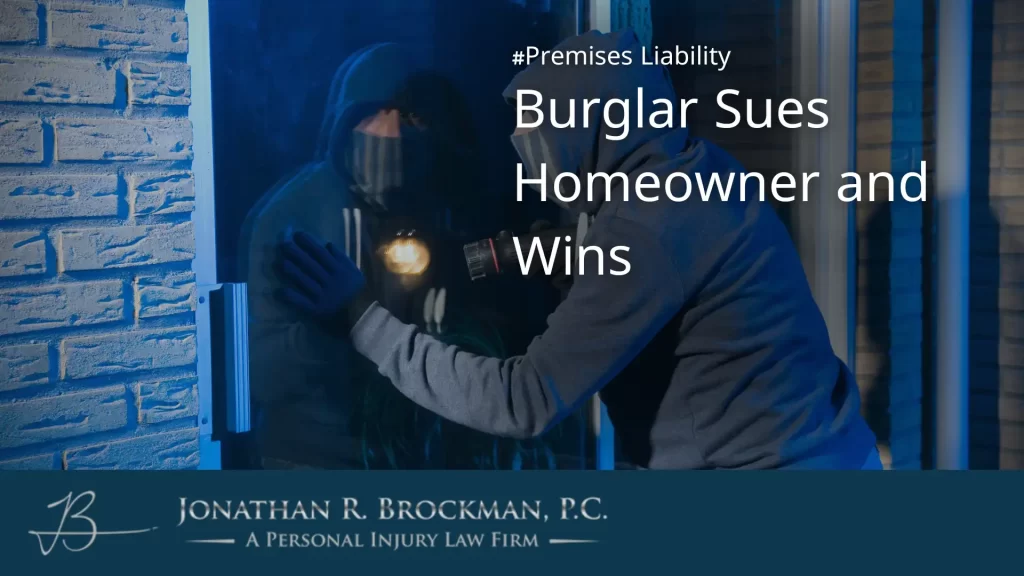Posted on Wednesday, March 20th, 2024 at 2:30 pm

You may have seen the headline “Burglar Sues Homeowner and Wins” somewhere on the internet in the last few decades. Often, it’s in reference to a story involving a plaintiff by the name of Terrence Dickinson or Terrence Dickson in Pennsylvania. Even in Georgia, you may have heard this story that’s made the rounds online throughout the country. Can this really happen? Is it possible for a burglar to sue a homeowner? In some instances, possibly, although those cases are rare.
Our legal team of premises liability lawyers focus on helping victims, but this is an interesting case that pushes the boundaries of personal injury and premises liability. If you have been a victim and don’t know if you have a personal injury claim, Jonathan R. Brockman, P.C. can help.
Contact us online or call Jonathan R. Brockman, P.C. at 770-205-8887. We work on a contingency fee basis, so you pay nothing unless your case is a success.
The Truth About the ‘Burglar Sues Homeowner’ Story
There are various versions of the famous Terrence Dickinson story. Again, some versions of the story use a slightly different name. There’s a reason for that.
The general details of the story are as follows:
- A burglar, Terrence Dickinson, broke into someone’s home in Pennsylvania. The owners were away at the time of the break-in.
- Dickinson got locked in the garage after breaking into the home.
- Dickinson had to subsist on dog food for eight days when he was locked in the home.
- Dickinson sued the homeowner for mental anguish. He received $500,000 as a result.
How Urban Legends Are Made?
It’s just the type of story sure to spark anger (or at least a few eye rolls) among those who believe ours is an overly litigious society. However, like so many stories of this type, there’s one big hole to it: It’s not true at all! This imaginary case of ‘burglar sues homeowner and wins’ was part of an email that was widely circulated and mistaken for the truth. It is believed the scenario of the case was created to highlight discussions about the 7th Amendment, tort reform, how civil juries make decisions, and whether civil juries should even make decisions.
Can a Burglar Sue for Injury in Georgia?
Like most states, Georgia has a premises liability law. It states that property owners have a duty to protect people on their properties. They must exercise reasonable care to guard against harm to their guests.
If someone gets hurt on another person’s property, they may be eligible to receive compensation. They could seek the compensation they may deserve by filing an insurance claim. Filing a lawsuit is also an option when the insurance company’s settlement offers are too low. However, a property owner’s duty under premises liability laws doesn’t extend to trespassers. A burglar doesn’t have a legal right to be on someone’s property. Thus, a property owner doesn’t have to take steps to protect them from injury.
Premises Liability Doesn’t Extend to Trespassers
That doesn’t mean a property owner can be exceptionally careless or malicious. For example, under premises liability laws, a property owner must warn their guests of hazards on the premises. Because premises liability duties don’t extend to trespassers, a property owner might assume they can hide hazards (like animal traps) on their property that trespassers might not know about. This isn’t the case.
Intentional Harm to Trespassers
For example, “burglar sues homeowner after falling on knife” makes for a good chain email headline. That said, it doesn’t reflect how premises liability laws work. However, a headline like “burglar sues homeowner for injuries resulting from spring guns” could theoretically refer to a true story. In this case, the presence of a spring gun indicates a homeowner was intentionally trying to harm trespassers. They may thus be liable for a burglar’s injuries.
Essentially, a property owner in Georgia doesn’t have to go out of their way to protect a burglar from harm. That doesn’t mean they have a right to actively attempt to hurt someone trespassing on their property.
When is a Georgia Property Owner Liable for a Trespasser’s Injuries?
 Along with the above example, there are a few other potential instances in which a property owner might be liable when a trespasser is hurt on their property. For example, the “attractive nuisance” doctrine states that certain potential hazards may attract a child to a property. Examples include pools, trampolines, and even discarded appliances like refrigerators.
Along with the above example, there are a few other potential instances in which a property owner might be liable when a trespasser is hurt on their property. For example, the “attractive nuisance” doctrine states that certain potential hazards may attract a child to a property. Examples include pools, trampolines, and even discarded appliances like refrigerators.
A very young child who doesn’t understand the risks involved may venture onto someone’s property to investigate such a nuisance. Technically, the child is trespassing in this scenario. However, perhaps they’re too young to understand that what they’re doing is illegal. The property owner might thus be liable for injuries they sustain.
Contact a Georgia Premises Liability Lawyer
Stories about burglars successfully suing homeowners highlight just how much confusion surrounds premises liability laws. If you’ve been hurt on someone else’s property, you may not know what your legal rights are.
That’s one of many reasons to consider reviewing your case with a Georgia premises liability lawyer. A member of our legal team at Jonathan R. Brockman, P.C. can go over the details of your case and explain your legal options. If you hire us, we’ll aggressively pursue the compensation you may deserve. Learn more about how we can help by contacting us online today or calling us at 770-205-8887 for a free case review.
Related Posts:
Common Types of Liability Accidents
Understanding Comparative Fault in Georgia
